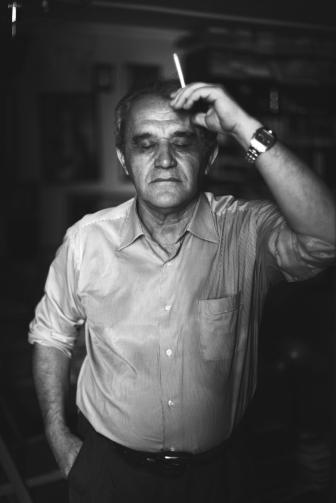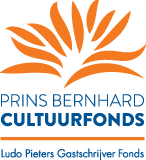Poet
Moikom Zeqo

Moikom Zeqo
(Albania, 1949)
© photographer unknown
Biography
Of the poet Moikom Zeqo it has been said that “during some of [the country's] darkest years, it sometimes seemed that there was only one real humanist in all of Albania, and that was Moikom.”
Comparing Zeqo's Zodiak, now available in English, to the Divine Comedy, Eliot’s Four Quartets, and Ernesto Cardenal’s Cántico Cósmico, American poet Ilya Kaminsky describes the book as a work of “unmistakably real and large poetic talent [that] builds a new cosmology all its own.”
Right after he completed his undergraduate studies at the University of Tirana, Zeqo was a rising star, named editor of the country’s official literary newspaper Drita (The Light), a position he held from 1971–3. He was also working on a poetry collection titled Meduza, which broke from the prescribed aesthetics of the Writers Union and critiqued Albania’s bureaucracy and cultural isolation. When Zeqo attempted to publish poems from Meduza, his work was denounced and he was “mercifully” (as Zeqo puts it) stripped of his editorship of Drita and obliged to work as a schoolteacher in a small mountain village. Meduza remained suppressed in Albania until 1994. In 2007, the U.S. publisher BOA Editions published a selection of poems from Meduza with the title I Don’t Believe in Ghosts. “The Chairs” and “Grotesque Motive” come from that book.
In 1979, after completing four years of “exile” in the mountains, Zeqo began working for the Durrës Archeological Museum. Having been a competitive swimmer in his youth, Zeqo became a specialist in underwater archeology—which features prominently in the poem “Zodiac: 2.” (Last spring, at the National Archeological Museum in Tirana, I pointed to an amphora crusted with oyster shells that was on display, and Moikom replied, “Oh yes, I pulled that up from 30 meters.”) During this time Zeqo also began publishing “safer” poems, as well as numerous monographs and children’s books.
In 1991, as Albanian communism was collapsing, Zeqo served as Albania’s Minister of Culture, and from 1992–6 he was a parliamentary representative in the Albanian Popular Assembly. In 1997, his wife Lida Miraj – also an archeologist, who famously excavated the Durrës Amphitheater – held a fellowship at Dumbarton Oaks in Washington, D.C., which is what brought the Zeqo-Miraj family to the United States, where we met. After returning to Albania in 1998, Zeqo directed the National Historical Museum in Tirana for a number of years. Since then, he has been a prominent writer, journalist, and public intellectual, and he has published an astonishing number of books, including numerous works of fiction.
In 2000, Zeqo published the poetry collection Zodiak, which Anastas Kapurani and I collaboratively translated, and which Zephyr Press published in the U.S. in 2015. The book uses the signs of the zodiac as a playful, generative scaffold, and the poems are obsessive and ecstatic as they think about Albanian and European history going back to antiquity. It is the sort of book in which the poet tries to say everything he knows—like Leaves of Grass or the Duino Elegies. Comparing it to the Divine Comedy, Eliot’s Four Quartets, and Ernesto Cardenal’s Cántico Cósmico, poet Ilya Kaminsky describes Zodiac as a work of “unmistakably real and large poetic talent [that] builds a new cosmology all its own.” The poems included here are numbers 2 (Pisces), 6 (Cancer), and 9 (Libra).
Just this past year, Zeqo received the title “Knight of the Order of Skanderbeg,” which is one of the very highest civilian honors an Albanian can receive. But what sticks with me most about Moikom’s astonishing life and work is a brief conversation I had after Zeqo and I read together from I Don’t Believe in Ghosts in Washington, D.C., in 2008. An Albanian expat came up to me to say how happy he was that Zeqo’s poetry was finding an audience in the U.S. “During some of those darkest years,” he said, “it sometimes seemed that there was only one real humanist in all of Albania, and that was Moikom.”
© Wayne Miller
BibliographyPoetry Books in English Translation:
Zodiac, translated by Anastas Kapurani & Wayne Miller, Zephyr Press (U.S.), 2015.
I Don’t Believe in Ghosts, translated by Wayne Miller, et al., BOA Editions (U.S.), 2007.
Poetry Books in Albanian (a selection):
Vegime të vendlindjes (Visions from the Motherland), 1968
Brenda Vetes (Inside Oneself), 1974 (a selection from Meduza published in Yugoslavia/Kosovo)
Njeqint Zemra (One Hundred Hearts), 1989
Meduza (Medusa), 1994 (also published in Greek translation)
Tempulli i Hënës (Temple of the Moon), 1998 (also published in Italian translation)
Nostradami në 3 Qershor (Nostradamus on the 3rd of June), 1999
Zodiak (Zodiac), 2000
Syzet e Thyera të Meduzës (Meduza’s Broken Glasses), 2001
Miscellaneat, në 12 Vëllime (Miscellanea in 12 Volumes), 12 volumes published between 2006-16
Në Anën e Trilluar të Kohës (On the Fictional Side of Time), 2017
Stina e Pestë (The Fifth Season), 2017
Këmbësori Kozmik (The Cosmic Pedestrian), 2018
Grifonë në Shishe (Griffins in a Bottle), 2018
Përjetësi me Qira (Eternity for Rent), 2018 (also published in Greek and Serbo-Croatian translations)
Golgotë Fluturash (A Golgotha of Butterflies), 2019
Prose Books in Albanian (a selection):
Kalorësit Dardanë (Dardanian Knights), 1975 (also published in Greek and Macedonian translations)
Dialoge në Lëvizje (Dialogue in Movement), 1981
Princi i Vjeshtës (The Prince of Autumn), 1991
Fjalëkryqët e Babilonisë (The Crossword of Babylon), 1999
Kështu Foli Mona Liza (Thus Spoke Mona Lisa), 1999
Mes Laokoontit dhe Krishtit (Between Laocoön and Christ), 2000
Syri i Tretë (The Third Eye), 2001
Grishja e Florimontit (Invitation to Florimont), 2002
Anima Mundi (Anima Mundi), 2003
Njeriu Jeshil (The Green Man), 2005
Gjumashët e Efesit (The Sleepers of Ephesus), 2007
Adami i Fshehur (The Hidden Adam), 2009
Shitësit e Kaosit (Sellers of Chaos), 2010
Klepsidra (Klepsidra), 2011
Libri i Sinopseve (The Book of Synopses), 2012
Papagajtë e Nemrotit (The Parrots of Nimrod), 2012
Shitja e Hënës (The Selling of the Moon), 2018
Centauri i Fundit (The Last Centaur), 2019
Poems
Poems of Moikom Zeqo
Sponsors





Partners
LantarenVenster – Verhalenhuis Belvédère

